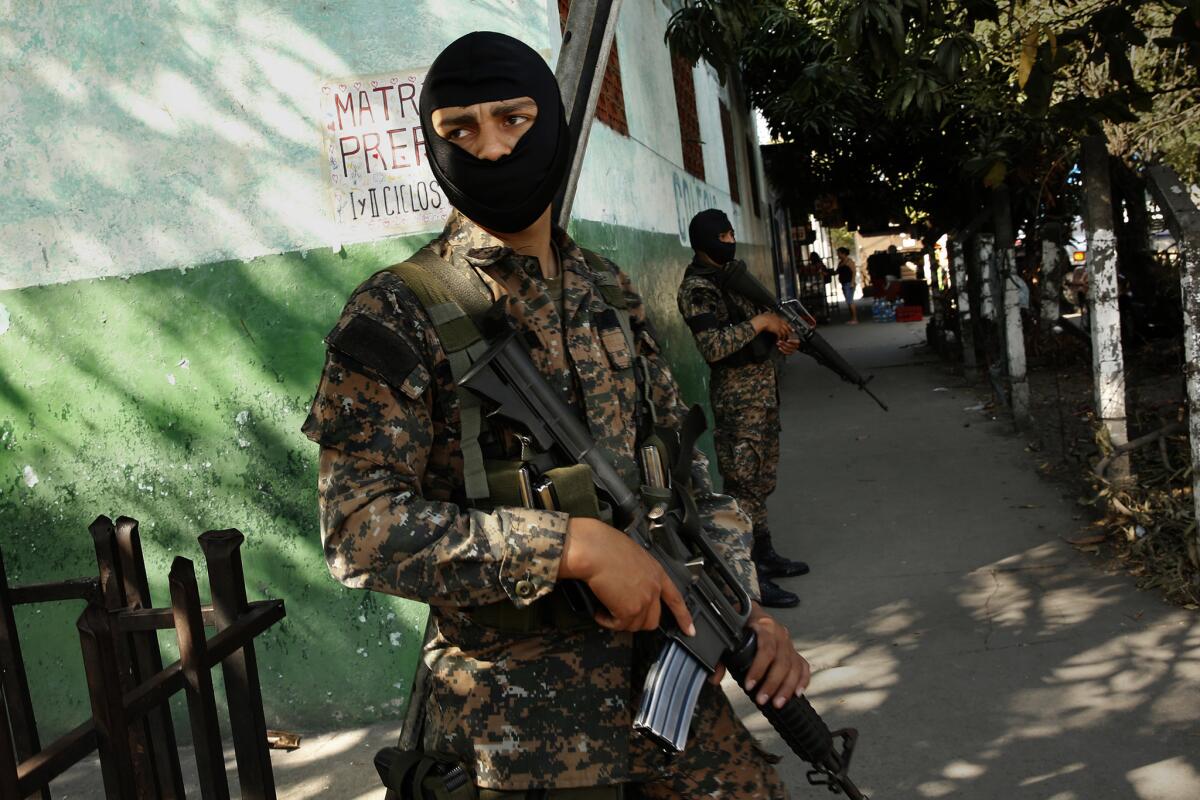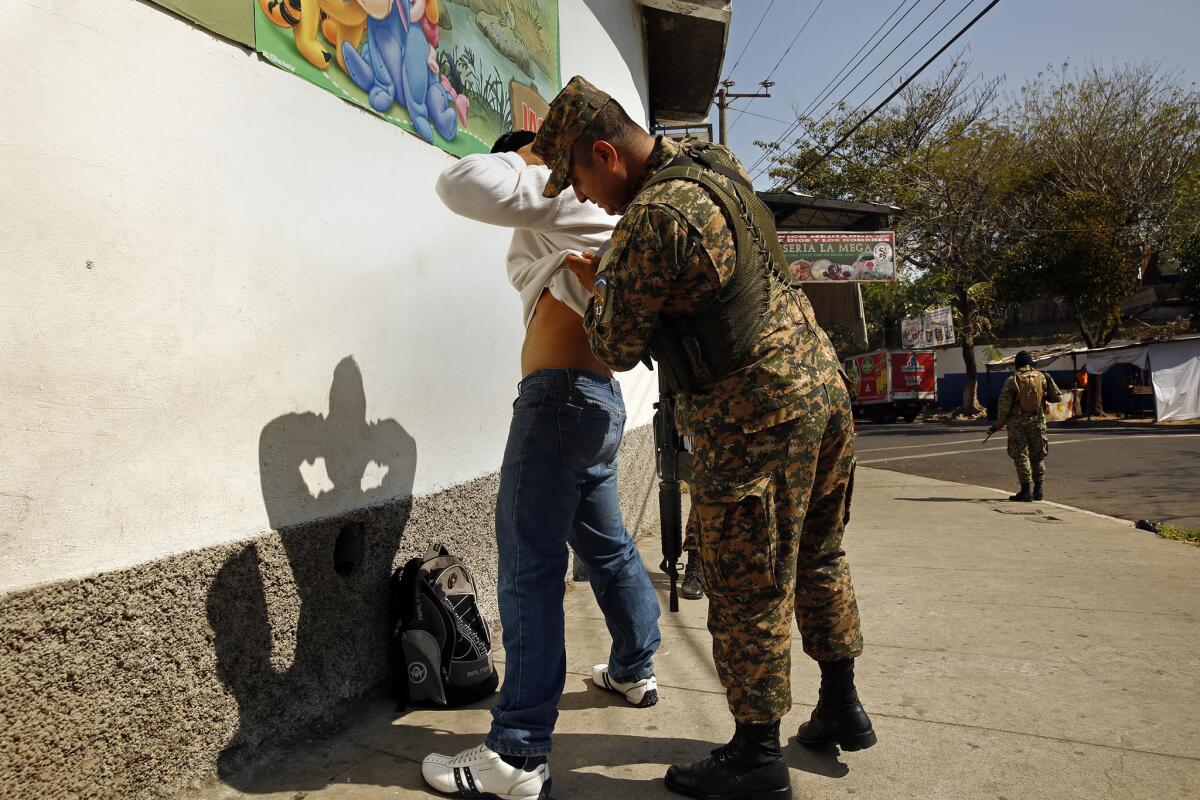Why tens of thousands of kids from El Salvador continue to flee to the United States

The death threats started last spring. Sixteen-year-old Mauricio Gomez answered a phone call from an unknown number and heard a nasal voice on the line.
Give me $400 by the end of the week, the gangster warned, or I’ll kill you and your family.
“Do you understand me?” the voice continued. “We can cut you into pieces.”
Mauricio, a lanky high school student who wore thick-framed glasses, hung up the phone, shaking. He had no idea who the gangster was, and he didn’t have $400.
He had to flee, Mauricio decided, but unlike the thousands of “unaccompanied minors” from Central America who braved the trek to the U.S. border in hopes of winning asylum, he applied for an Obama administration program that would allow him — just possibly — to join family in the United States.
But would the program take him? And could he survive the gangs until it did?
Although a fierce military crackdown on El Salvador’s two main warring gangs has chipped away at violent crime in the last year, this tiny Central American nation remains one of the most dangerous places on Earth, with a per capita homicide rate more than 15 times that of the United States.
Children as young as 9 are recruited for gang membership. Extortion is rampant, with gangs squeezing street vendors, restaurant owners and even grandmothers for cash.
Last year, nearly 1 in 4 people were victims of a crime, according to a poll conducted by Central American University, which also found that more than 40% of Salvadorans hoped to leave the country within a year. In certain areas, such as Mauricio’s hometown of Sonsonate, located on a strategic drug route on the Pacific Coast, many people rarely venture out after dark.
The specter of violence is driving increasing numbers of asylum seekers to nearby countries, such as Costa Rica and Mexico, while thousands of others attempt the perilous 2,000-mile journey to the U.S.
A record 17,512 unaccompanied Salvadoran children were apprehended at the U.S. border in the fiscal year that ended in September, according to the Department of Homeland Security. It was an 87% increase over the year before.
More than 27,000 minors or adults traveling in family units also were apprehended; that was a 150% increase.
After the threatening phone calls continued, and menacing-looking men started loitering outside the house, Mauricio and his family decided last summer to test the new program created by President Obama that allows Central American children with at least one parent living legally in the U.S. to apply for refugee status while in their home country.
More than 10,000 young people have applied for the program, which was designed to protect children from the risks of the migrant path and help stop the flow of unauthorized migrants north. Immigrant advocates have hailed the effort as a small but important step toward recognizing the violence in El Salvador and neighboring countries.
Mauricio endured months of vetting. He was asked to play recordings of the death threats for U.S. Citizenship and Immigration Services officers. He submitted DNA samples, underwent background checks and stripped off his clothing in front of a doctor to prove he was free of infectious disease.
Last month, he received a letter saying he had been granted refugee status, and the international body that helps administer the program had booked him a seat on a flight to Los Angeles on Feb. 9. The family wept with joy.
But a new U.S. president with deep doubts about the country’s refugee programs was about to complicate things.

Over the last four decades, violence has become as much a part of life in El Salvador as muggy summers and periodic eruptions of the country’s active volcanoes.
The civil war, which pitted leftist guerrillas against the U.S.-backed right-wing government, raged for 12 years, killed 75,000 people and caused millions to flee. An estimated 2 million people of Salvadoran origin now reside in the United States, according to the Pew Research Center, about 700,000 of them illegally.
Mauricio’s father, Max, left San Salvador for Los Angeles in 1981, after he said he was targeted by the military for speaking out in favor of leftist leaders. He and his wife, Alicia, received green cards after President Reagan signed a bill in 1986 granting amnesty to many people living in the U.S. without permission.
After a peace treaty ended the war in 1992, Max returned to El Salvador, where Alicia gave birth to Mauricio. He worked as a criminal lawyer, occasionally representing members of gangs, such as
The government has estimated that nearly half a million people are now connected to the gangs — in a country of slightly more than 6 million.
Since 2003, the government has taken what it calls an “iron fist” approach to criminal groups, sending soldiers armed with automatic weapons and dressed in black balaclavas into gang-controlled areas. Recently, federal prosecutors have accused law enforcement officials of going too far — of “disappearing” young men — and residents of some neighborhoods have complained of extrajudicial killings.
Many people, including Mauricio, know someone who has been slain. The father of one of his friends was shot by a gangster not long ago after taking money out of an ATM.
“It’s getting worse,” he said. “We are in a war.”

His father and mother fled to Los Angeles for a second time several years ago after gangsters started demanding that Max represent them in court for free. Mauricio remained at the family’s pretty red stucco home in Sonsonate, a colonial-era city with cobblestone streets lined with vendors frying tortillas and pupusas.
They became one more transnational family in El Salvador, where as many as 40% of young people grow up without one or both parents because of migration.
For children like Mauricio, having parents living in the United States was a boon and bane: They sent money for nice things, but occasionally you were robbed of those nice things, like when gangsters with knives jumped Mauricio as he got off his school bus in 2015 and demanded that he hand over his new sneakers and wristwatch.
The phone calls were different than being randomly targeted on the street. They were incessant, for one. The gangsters called so many times, even after Mauricio changed his phone number, that for a short time he thought that joining the gang might be his only way out.
Mauricio lived alone, looked after by a housekeeper and his older sister, who lived with her own family. They installed boards on the front windows of the house after Mauricio spied a man peering in. The housekeeper quit, saying she was afraid, and Mauricio started sleeping in an upstairs bedroom that was harder to reach from the outside.
He stopped going to school for several weeks — afraid he’d be jumped on the long bus ride — and transferred to a closer school guarded by armed security officers.
“Leave here, leave here, you have to leave,” he remembers thinking.
He just had to hang on until Feb. 9, the day he was to leave for Los Angeles. His father flew down to help him pack and to close up the house. They canceled the Internet and the power.
Then, 14 days before he was supposed to leave, President Trump issued an executive order calling for the immediate suspension of all refugee admissions to the U.S. for 120 days. That included Mauricio, who received a second letter, this one telling him the program was on hold.
He and his father wept again. Mauricio spoke to his brother and sister in the U.S., both citizens, who apologized for having voted for Trump. Then he unpacked his bags.
Mauricio and his father considered their options. Should he go to Mexico to seek asylum there? Or maybe to Italy, where they had extended family? But they didn’t have that kind of money. Father and son slunk around the neighborhood, trying not to attract attention.
And then, last weekend, came beautiful news: A federal judge issued an injunction on Trump’s ban, freeing migrants to travel. An appeals court upheld the injunction Thursday. That same day, Mauricio and Max boarded a plane for LAX.
Mauricio was met there by a brother and his mother, who gathered him in her arms. They went to celebrate at a doughnut shop and then took in a movie.
He was taken aback by how nice people in the U.S. were, and how pretty Los Angeles was. The best part, he said, was that he felt safe.
Twitter: @katelinthicum
Sign up for Essential California
The most important California stories and recommendations in your inbox every morning.
You may occasionally receive promotional content from the Los Angeles Times.








